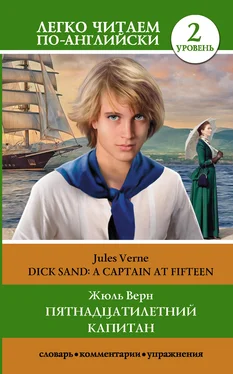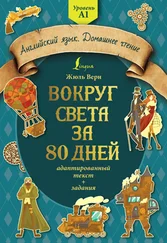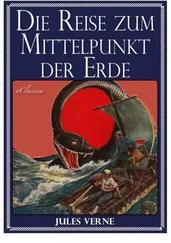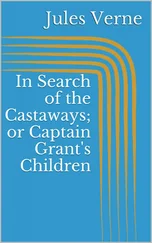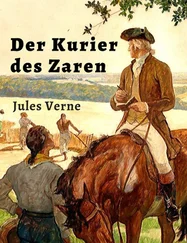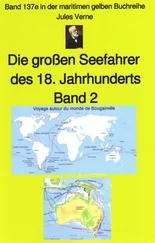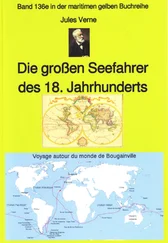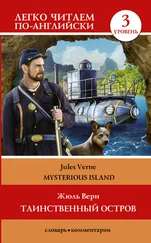“Oh, Dingo, Dingo! you mustn’t eat my letters!” shouted the child.
But the dog came back again, and picked up another letter. This time it was a capital V. Jack uttered an exclamation of astonishment which brought to his side not only his mother, but the captain and Dick. Jack cried out in the greatest excitement that Dingo knew how to read.
Dick Sand smiled and stooped to take back the letters. Dingo snarled and showed his teeth, but the apprentice was not frightened. He replaced the two blocks among the rest. Dingo in an instant pounced upon them again, and laid a paw upon each of them.
“It is very strange,” said Mrs. Weldon; “he has picked out S V again.”
“S V!” repeated the captain thoughtfully; “are not those the letters that form the initials on his collar?”
He turned to the old negro, and continued,
“Tom didn’t you say that this dog did not always belong to the captain of the ‘Waldeck’?”
“I often heard from the captain,” replied Tom, “that he found the dog at the mouth of the Congo [13] at the mouth of the Congo – у устья Конго
.”
Mrs. Weldon asked, -
“Do you recall these letters, captain?”
“Mrs. Weldon,” the captain replied; “I can associate them with the fate of a brave explorer.”
“Whom do you mean?” said the lady.
“In 1871, just two years ago,” the captain continued, “a French traveller set out to cross Africa from west to east. His starting-point was the mouth of the Congo, and his exit was Cape Deldago, at the mouth of the River Rovouma [14] River Rovouma – река Ровума
. The name of this man was Samuel Vernon. These letters – Vernon’s initials – are engraved on Dingo’s collar.”
“What do we know about this traveller?” asked Mrs. Weldon.
“Nothing. I think that he failed to reach the east coast. He died upon his way, or he was made prisoner [15] he was made prisoner – его взяли в плен
by the natives. Did this dog belong to him?”
“But you have no reason to suppose, Captain Hull, that Vernon ever owned a dog?”
“I never heard of it,” said the captain; “but the dog knows these letters. Look at the animal, madam! It does not only read the letters for himself, but invites us to come and read them with him.”
Whilst Mrs. Weldon was watching the dog with much amusement, Dick Sand asked the captain whether the traveller Vernon started on his expedition quite alone.
“That is really more than I can tell you, my boy,” answered Captain Hull.
Meanwhile Negoro quietly appeared on deck. The dog caught sight of the cook and began to bristle with rage. Negoro withdrew immediately to his room.
The incident did not escape the captain’s observation.
“No doubt,” he said, “there is some mystery here.”
“Don’t you think, sir, it’s strange that this dog knows the alphabet?”
“My mamma told me about a dog whose name was Munito, who could read as well as a schoolmaster, and could play dominoes,” said Jack.
Mrs. Weldon smiled.
“I am afraid, my child, the dog’s master, who was a clever American, taught Munito some curious tricks.”
“The more I think of it, the more strange it is,” said Captain Hull; “Dingo evidently has no acquaintance with any other letters except the two S V. Some circumstance which we cannot guess made the animal familiar with them.”
“What a pity Dingo cannot talk!” exclaimed the apprentice.
The dog’s manners repeatedly formed a subject of conversation between Mrs. Weldon, the captain, and Dick. The young apprentice does not trust Negoro, although the man’s conduct in general gave no grounds for suspicion.
Dingo soon gained the reputation of the cleverest dog in the world.
“Perhaps Dingo can,” suggested Bolton, the helmsman, “some fine day predict which way the wind lies.”
“Ah! why not?” assented another sailor; “parrots talk, and magpies talk; why can’t a dog? I think it is easier to speak with a mouth than with a beak.”
“Of course it is,” said Howick, the boatswain; “but who knows a talking dog?”
Thus Dingo became a hero. On several occasions Captain Hull repeated the experiment with the blocks, invariably with the same result; the dog never failed.
But Cousin Benedict took no interest in that.
“You cannot suppose,” he said to Captain Hull, after various repetitions of the trick, “that dogs are the only animals endowed with intelligence. Rats, you know, always leave a sinking ship, and beavers invariably raise their dams before the approach of a flood. And insects! Are not the structures of ants the very models for the architects of a city? And cannot fleas go through a drill and fire a gun as well as the artillerymen? This Dingo is not very interesting. Perhaps one day or other it may be identified as the ‘ canis alphabeticus [16] canis alphabeticus – собака-грамотей
’ of New Zealand.”
Anyway, Dingo was regarded as a phenomenon. This feeling was not shared by Negoro. He studiously avoided the animal, and Dick Sand was quite convinced that the cook’s hatred of the dog became still more intense.
This portion of the Pacific is almost always deserted. It is out of the line of the American and Australian steamers.
Sometimes white petrels congregated near the schooner; and sometimes petrels with brown borders on their wings came in sight.
On the day the wind shifted, Mrs. Weldon was walking up and down on the “Pilgrim’s” stern, when her attention was attracted by a strange phenomenon. Both Dick and Jack were standing close behind her, and she cried, -
“Look, Dick, look! The sea is all red. Is a seaweed making the water so strange?”
“No,” answered Dick, “it is not a weed; it is what the sailors call whales’ food. These are innumerable myriads of minute crustacea.”
“Crustacea,” replied Mrs. Weldon, “but they must be so small that they are mere insects. Cousin Benedict no doubt will like to see them.”
She called aloud, -
“Benedict! Benedict! Come here! We have here something interesting for you.”
The amateur naturalist slowly emerged from his cabin followed by Captain Hull.
“Ah! Yes, I see!” said the captain; “whales’ food; just the opportunity for you, Mr. Benedict, to study one of the most curious of the crustacea.”
“Nonsense!” ejaculated Benedict contemptuously; “utter nonsense!”
“Why? What do you mean, Mr. Benedict?” retorted the captain.
“Are you not aware, sir, that I am an entomologist?”
Captain Hull was unable to repress a smile, and turning to Mrs. Weldon, he continued, -
“When a whale gets into the middle of them it just opens its jaws, and, in a minute, hundreds of thousands of these minute creatures are inside the fringe or whalebone around its palate.”
Then they heard a shout from one of the sailors,”A whale!”
“There’s the whale!” repeated the captain. He hurried to the bow, followed by all the passengers. Even Cousin Benedict took a share in the general interest.
There was no doubt about the matter. An unusual commotion in the water showed the presence of a whale. Captain Hull and his crew gazed at the animal.
The captain’s eye soon enabled him to observe a column of water and vapour from the nostrils. “It isn’t a real whale,” he said; “the whale’s spout is small and rises high in the air. Dick, tell me, what do you think about it?”
With a critical eye Dick Sand looked long and steadily at the spout.
Читать дальше
